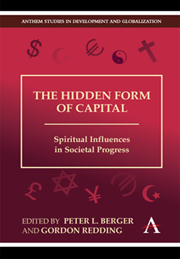Book contents
- Frontmatter
- Contents
- Contributors
- Preface
- Chapter 1 Introduction: Spiritual, Social, Human, and Financial Capital
- Chapter 2 Do Some Religions Do Better than Others?
- Chapter 3 Spiritual Capital and Economic Development: An Overview
- Chapter 4 The Possibilities and Limitations of Spiritual Capital in Chinese Societies
- Chapter 5 How Evangelicanism – Including Pentecostalism – Helps the Poor: The Role of Spiritual Capital
- Chapter 6 Flying under South Africa's Radar: The Growth and Impact of Pentecostals in a Developing Country
- Chapter 7 Importing Spiritual Capital: East-West Encounters and Capitalist Cultures in Eastern Europe After 1989
- Chapter 8 Orthodox Spiritual Capital and Russian Reform
- Chapter 9 Islam and Spiritual Capital: An Indonesian Case Study
- Chapter 10 Separating Religious Content from Religious Practice: Loose and Tight Institutions and their Relevance in Economic Evolution
Chapter 5 - How Evangelicanism – Including Pentecostalism – Helps the Poor: The Role of Spiritual Capital
Published online by Cambridge University Press: 05 March 2012
- Frontmatter
- Contents
- Contributors
- Preface
- Chapter 1 Introduction: Spiritual, Social, Human, and Financial Capital
- Chapter 2 Do Some Religions Do Better than Others?
- Chapter 3 Spiritual Capital and Economic Development: An Overview
- Chapter 4 The Possibilities and Limitations of Spiritual Capital in Chinese Societies
- Chapter 5 How Evangelicanism – Including Pentecostalism – Helps the Poor: The Role of Spiritual Capital
- Chapter 6 Flying under South Africa's Radar: The Growth and Impact of Pentecostals in a Developing Country
- Chapter 7 Importing Spiritual Capital: East-West Encounters and Capitalist Cultures in Eastern Europe After 1989
- Chapter 8 Orthodox Spiritual Capital and Russian Reform
- Chapter 9 Islam and Spiritual Capital: An Indonesian Case Study
- Chapter 10 Separating Religious Content from Religious Practice: Loose and Tight Institutions and their Relevance in Economic Evolution
Summary
Introduction
The idea that Evangelical Protestantism – including in its Pentecostal variants – can generate resources for promoting economic and political development is nothing new. In 1958, Edward Banfield argued in his classic study, The Moral Basis of a Backward Society, that the underdevelopment he observed in a southern Italian village resulted primarily from an ethos of ‘amoral familism’ – an exclusive concern for one's sib over and against the common good (Banfield 1958). This ethos consisted of an extreme distrust of individuals and groups outside of one's family and virtually guaranteed that those in its grip would refuse to undertake joint activities or form wider associations to better themselves.
Banfield concluded his book by reflecting on how this ‘amoral familism’ might be overcome. One possibility lay in the region's religious and spiritual transformation. ‘The change in outlook that is needed’, Banfield surmised, ‘might conceivably come as the by-product of Protestant missionary activity’ (Banfield 1958: 162). As a basis for this suggestion, he cited a 1955 article by anthropologist Emílio Willems, ‘Protestantism as a Factor of Culture Change in Brazil’. According to Banfield's summary, Willems found that ‘[i]n Brazil Protestantism is reported to have created among its adherents an unprecedented participation in group affairs and to have reduced illiteracy, dishonesty, and gambling’ (Banfield 1958: 162 n. 8). The type of Protestantism largely responsible for these profound transformations, Willems, observed in more than a decade of field work in the 1950s and 1960s, was fervent Evangelicalism, especially Pentecostalism.
- Type
- Chapter
- Information
- The Hidden Form of CapitalSpiritual Influences in Societal Progress, pp. 61 - 90Publisher: Anthem PressPrint publication year: 2010
- 3
- Cited by



